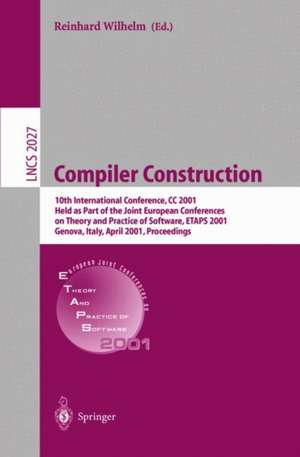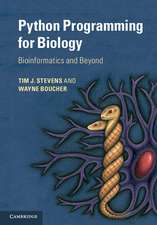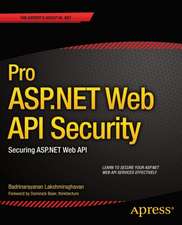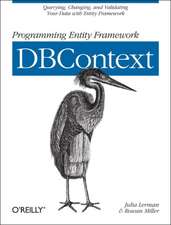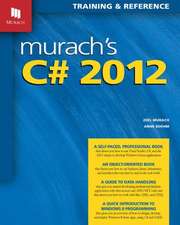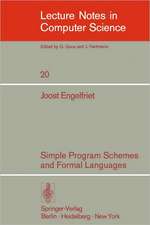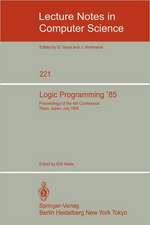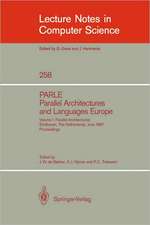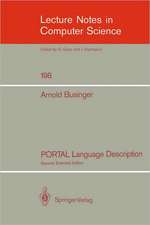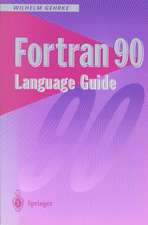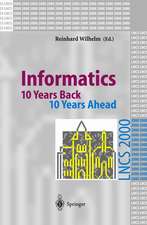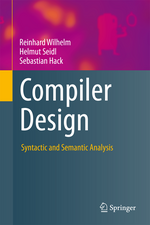Compiler Construction: 10th International Conference, CC 2001 Held as Part of the Joint European Conferences on Theory and Practice of Software, ETAPS 2001 Genova, Italy, April 2-6, 2001 Proceedings: Lecture Notes in Computer Science, cartea 2027
Autor Reinhard Wilhelmen Limba Engleză Paperback – 21 mar 2001
Din seria Lecture Notes in Computer Science
- 20%
 Preț: 1061.55 lei
Preț: 1061.55 lei - 20%
 Preț: 307.71 lei
Preț: 307.71 lei - 20%
 Preț: 438.69 lei
Preț: 438.69 lei - 20%
 Preț: 579.30 lei
Preț: 579.30 lei -
 Preț: 410.88 lei
Preț: 410.88 lei - 17%
 Preț: 427.22 lei
Preț: 427.22 lei - 20%
 Preț: 596.46 lei
Preț: 596.46 lei - 15%
 Preț: 448.04 lei
Preț: 448.04 lei - 20%
 Preț: 353.50 lei
Preț: 353.50 lei -
 Preț: 389.49 lei
Preț: 389.49 lei - 20%
 Preț: 309.90 lei
Preț: 309.90 lei - 20%
 Preț: 645.28 lei
Preț: 645.28 lei - 20%
 Preț: 763.23 lei
Preț: 763.23 lei - 15%
 Preț: 580.46 lei
Preț: 580.46 lei - 20%
 Preț: 310.28 lei
Preț: 310.28 lei - 20%
 Preț: 655.02 lei
Preț: 655.02 lei - 20%
 Preț: 1183.14 lei
Preț: 1183.14 lei - 20%
 Preț: 340.32 lei
Preț: 340.32 lei -
 Preț: 449.57 lei
Preț: 449.57 lei - 20%
 Preț: 591.51 lei
Preț: 591.51 lei - 18%
 Preț: 938.83 lei
Preț: 938.83 lei - 20%
 Preț: 337.00 lei
Preț: 337.00 lei - 20%
 Preț: 649.50 lei
Preț: 649.50 lei - 20%
 Preț: 607.40 lei
Preț: 607.40 lei - 20%
 Preț: 1414.79 lei
Preț: 1414.79 lei - 20%
 Preț: 1024.44 lei
Preț: 1024.44 lei - 20%
 Preț: 583.40 lei
Preț: 583.40 lei - 20%
 Preț: 453.32 lei
Preț: 453.32 lei - 20%
 Preț: 575.49 lei
Preț: 575.49 lei - 20%
 Preț: 1075.26 lei
Preț: 1075.26 lei - 20%
 Preț: 585.88 lei
Preț: 585.88 lei - 20%
 Preț: 825.93 lei
Preț: 825.93 lei - 17%
 Preț: 360.20 lei
Preț: 360.20 lei - 20%
 Preț: 763.23 lei
Preț: 763.23 lei - 20%
 Preț: 340.32 lei
Preț: 340.32 lei - 20%
 Preț: 504.58 lei
Preț: 504.58 lei - 20%
 Preț: 369.13 lei
Preț: 369.13 lei - 20%
 Preț: 580.93 lei
Preț: 580.93 lei - 20%
 Preț: 343.62 lei
Preț: 343.62 lei - 20%
 Preț: 350.21 lei
Preț: 350.21 lei - 20%
 Preț: 583.40 lei
Preț: 583.40 lei - 20%
 Preț: 583.40 lei
Preț: 583.40 lei - 15%
 Preț: 438.59 lei
Preț: 438.59 lei - 20%
 Preț: 341.95 lei
Preț: 341.95 lei - 20%
 Preț: 238.01 lei
Preț: 238.01 lei - 20%
 Preț: 538.30 lei
Preț: 538.30 lei
Preț: 336.86 lei
Preț vechi: 421.08 lei
-20% Nou
Puncte Express: 505
Preț estimativ în valută:
64.48€ • 70.06$ • 54.20£
64.48€ • 70.06$ • 54.20£
Carte tipărită la comandă
Livrare economică 21 aprilie-05 mai
Preluare comenzi: 021 569.72.76
Specificații
ISBN-13: 9783540418610
ISBN-10: 354041861X
Pagini: 388
Ilustrații: XII, 376 p.
Dimensiuni: 216 x 279 x 20 mm
Greutate: 0.54 kg
Ediția:2001
Editura: Springer Berlin, Heidelberg
Colecția Springer
Seria Lecture Notes in Computer Science
Locul publicării:Berlin, Heidelberg, Germany
ISBN-10: 354041861X
Pagini: 388
Ilustrații: XII, 376 p.
Dimensiuni: 216 x 279 x 20 mm
Greutate: 0.54 kg
Ediția:2001
Editura: Springer Berlin, Heidelberg
Colecția Springer
Seria Lecture Notes in Computer Science
Locul publicării:Berlin, Heidelberg, Germany
Public țintă
ResearchCuprins
Invited Paper.- Virtual Classes and Their Implementation.- Program Analysis.- Alias Analysis by Means of a Model Checker.- Points-to and Side-Effect Analyses for Programs Built with Precompiled Libraries.- A Novel Probabilistic Data Flow Framework.- Program Transformation.- Imperative Program Transformation by Rewriting.- Compiler Transformation of Pointers to Explicit Array Accesses in DSP Applications.- User-Extensible Simplification—Type-Based Optimizer Generators.- A Practical, Robust Method for Generating Variable Range Tables.- Program Analysis.- Efficient Symbolic Analysis for Optimizing Compilers.- Interprocedural Shape Analysis for Recursive Programs.- Design-Driven Compilation.- Intraprocessor Parallelism.- Software Pipelining of Nested Loops.- A First Step Towards Time Optimal Software Pipelining of Loops with Control Flows.- Comparing Tail Duplication with Compensation Code in Single Path Global Instruction Scheduling.- Register Saturation in Superscalar and VLIW Codes.- Parsing.- Directly-Executable Earley Parsing.- A Bounded Graph-Connect Construction for LR-regular Parsers.- Memory Hierarchy.- Array Unification: A Locality Optimization Technique.- Optimal Live Range Merge for Address Register Allocation in Embedded Programs.- Speculative Prefetching of Induction Pointers.- Constant-Time Root Scanning for Deterministic Garbage Collection.- Profiling.- Goal-Directed Value Profiling.- A Framework for Optimizing Java Using Attributes.- Demos.- SmartTools: A Generator of Interactive Environments Tools.- Visual Patterns in the VLEli System.- The Asf+Sdf Meta-environment: A Component-Based Language Development Environment.
Caracteristici
Includes supplementary material: sn.pub/extras
